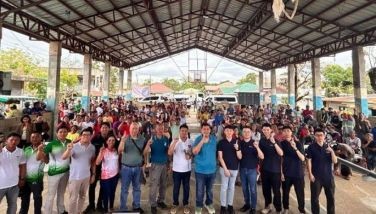Bullish

The year ends with some promising notes. The peso recovered some ground and the stock market is at its peak.
People are generally bullish about the year ahead. Our economy has had a good run and now seems poised to outdo itself.
The first package of the tax reform program will take effect on the first day of the New Year. That package raises exemptions and lowers rates for personal income taxes. That means wageworkers now have more disposable income. That will help firm up consumption demand in the economy.
Although the final version of the tax reform package will deliver less revenues than expected, it will produce enough to support the ambitious infrastructure program government has set in place. Build, Build, Build is ready to roll. The key projects have passed NEDA scrutiny and several have broken ground.
Improved consumer demand and the stimulus the infrastructure program will provide guarantee more robust economic expansion. Growth in 2018 will almost certainly be more impressive than whatever the final number are for 2107.
Our economic managers are holding fast to their projections of seven percent growth. That will make us one of the fastest growing economies in the world. The Philippines will proudly be a growth engine for the global economy.
To be sure, we have enough headroom and suppressed demand to sustain fast-paced growth. We certainly have the young population to man a rapidly expanding economy.
The problems we face are good problems. It will be a challenge to hold inflation to below four percent next year. Our monetary authorities, however, have enough in their toolbox to deal with the early symptoms of overheating.
We will likely see a spike in investment inflows next year. A lot of the investments coming in will be in manufacturing. This is good. Manufacturing creates meaningful jobs even more those without college degrees.
The tax reform program and the ambitious infrastructure initiative espoused by the Duterte administration are inseparable. New revenues are needed for economic investments. The improvement of our logistics backbone, in turn, will improve domestic efficiency and draw in more investments. New investments will create new jobs to bring millions into the economic mainstream.
If we want inclusive growth, we need to transform our economic development from the traditional consumption-led pattern to one led by investments. Employment, not dole-outs, will bring progress to the grassroots.
There are early indications of increased investments in our economy. The loan portfolio of our domestic banks grew 17 percent by end-October this year over the same period the year before.
The money lent out is not being stashed under mattresses, to be sure. The loans are used to grow businesses.
All the money being invested in infra by both government and the private sector will make our economic expansion sustainable into the longer term. The biggest disincentive to investments in our economy is the high cost of moving people and goods due to congested infra. That cost will be brought down as new infra is built.
As we modernize our infra backbone, our production costs will come down to competitive levels. The investment community will surely respond to that.
Our strategy for rapid but inclusive growth is hard-nosed and well grounded. The international investment community sees that.
Scaffolding
We are not growing our economy in a vacuum.
Our economic growth momentum is driven by progress in building a regional economy for Southeast Asia. That regional economy provides a larger market for our businesses. It opens the doors to robust capital flows from other businesses in the region.
The emerging ASEAN regional economy enabled more comprehensive economic cooperation with our partner-economies. In creates conditions for businesses in the region to achieve economies of scale and focus on specific areas of competence. This is the reason our domestic conglomerates are investing boldly and growing confidently throughout the region.
We do not want for talent and visionaries.
Early on, for instance, Carlos Chan of Oishi read the signs correctly and expanded his production network beyond our borders. Now he has 17 plants all over China and half-a-dozen more in countries from Vietnam to India. All those plants have Filipino managers and senior staff.
San Miguel group’s Petron acquired distribution networks in Malaysia. Using domestically acquired expertise, other Filipino conglomerates are building expressways and ports abroad. Ramon Ang has made strategic acquisitions in Australia and Ayala Corp. is into water projects elsewhere in Southeast Asia.
Our biggest steel manufacturer, SteelAsia, is building a multi-billion dollar manufacturing estate in Batangas. That estate will host related manufacturing enterprises from the rest of the region. This will enable us to go into downstream steel products to support both our infra build-up and the needs of other nearby markets.
I am not so sure why our Department of Trade and Industry (DTI) is so obsessed with building a car manufacturing program. Vehicles running on petrol are about to go the way of the dinosaur. In a few years, electric vehicles (mostly driven using artificial intelligence) will be the norm. We ought to move ahead of the curve.
The point, however, is that we have enough enterprises prepared to ride the crest of regionalization. We ought to be supporting these enterprises.
The synergies produced by regionalization will hasten backward- and forward-linkages among our most productive enterprises. This includes linking our basic agriculture to the processed foods chain, making our manufacturing part of a larger regional network and building services support for industries.
To get there, we should modernize our domestic logistics system as fast as we can.
- Latest
- Trending


























